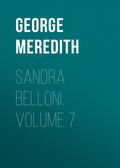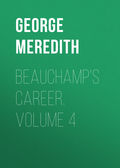
George Meredith
Vittoria. Volume 6
CHAPTER XXIX
EPISODES OF THE REVOLT AND THE WAR—THE TOBACCO-RIOTS—RINALDO GUIDASCARPI
Anna von Lenkenstein was one who could wait for vengeance. Lena punished on the spot, and punished herself most. She broke off her engagement with Wilfrid, while at the same time she caused a secret message to be conveyed to him, telling him that the prolongation of his residence in Meran would restore him to his position in the army.
Wilfrid remained at Meran till the last days of December.
It was winter in Milan, turning to the new year—the year of flames for continental Europe. A young man with a military stride, but out of uniform, had stepped from a travelling carriage and entered a cigar-shop. Upon calling for cigars, he was surprised to observe the woman who was serving there keep her arms under her apron. She cast a look into the street, where a crowd of boys and one or two lean men had gathered about the door. After some delay, she entreated her customer to let her pluck his cloak halfway over the counter; at the same time she thrust a cigar- box under that concealment, together with a printed song in the Milanese dialect. He lifted the paper to read it, and found it tough as Russ. She translated some of the more salient couplets. Tobacco had become a dead business, she said, now that the popular edict had gone forth against 'smoking gold into the pockets of the Tedeschi.' None smoked except officers and Englishmen.
"I am an Englishman," he said.
"And not an officer?" she asked; but he gave no answer. "Englishmen are rare in winter, and don't like being mobbed," said the woman.
Nodding to her urgent petition, he deferred the lighting of his cigar. The vetturino requested him to jump up quickly, and a howl of "No smoking in Milan—fuori!—down with tobacco-smokers!" beset the carriage. He tossed half-a-dozen cigars on the pavement derisively. They were scrambled for, as when a pack of wolves are diverted by a garment dropped from the flying sledge, but the unluckier hands came after his heels in fuller howl. He noticed the singular appearance of the streets. Bands of the scum of the population hung at various points: from time to time a shout was raised at a distance, "Abasso il zigarro! "and "Away with the cigar!" went an organized file-firing of cries along the open place. Several gentlemen were mobbed, and compelled to fling the cigars from their teeth. He saw the polizta in twos and threes taking counsel and shrugging, evidently too anxious to avoid a collision. Austrian soldiers and subalterns alone smoked freely; they puffed the harder when the yells and hootings and whistlings thickened at their heels. Sometimes they walked on at their own pace; or, when the noise swelled to a crisis, turned and stood fast, making an exhibition of curling smoke, as a mute form of contempt. Then commenced hustlings and a tremendous uproar; sabres were drawn, the whitecoats planted themselves back to back. Milan was clearly in a condition of raging disease. The soldiery not only accepted the challenge of the mob, but assumed the offensive. Here and there they were seen crossing the street to puff obnoxiously in the faces of people. Numerous subalterns were abroad, lively for strife, and bright with the signal of their readiness. An icy wind blew down from the Alps, whitening the housetops and the ways, but every street, torso, and piazza was dense with loungers, as on a summer evening; the clamour of a skirmish anywhere attracted streams of disciplined rioters on all sides; it was the holiday of rascals.
Our traveller had ordered his vetturino to drive slowly to his hotel, that he might take the features of this novel scene. He soon showed his view of the case by putting an unlighted cigar in his mouth. The vetturino noted that his conveyance acted as a kindling-match to awaken cries in quiet quarters, looked round, and grinned savagely at the sight of the cigar.
"Drop it, or I drop you," he said; and hearing the command to drive on, pulled up short.
They were in a narrow way leading to the Piazza de' Mercanti. While the altercation was going on between them, a great push of men emerged from one of the close courts some dozen paces ahead of the horse, bearing forth a single young officer in their midst.
"Signore, would you like to be the froth of a boiling of that sort?" The vetturino seized the image at once to strike home his instance of the danger of outraging the will of the people.
Our traveller immediately unlocked a case that lay on the seat in front of him, and drew out a steel scabbard, from which he plucked the sword, and straightway leaped to the ground. The officer's cigar had been dashed from his mouth: he stood at bay, sword in hand, meeting a rush with a desperate stroke. The assistance of a second sword got him clear of the fray. Both hastened forward as the crush melted with the hiss of a withdrawing wave. They interchanged exclamations: "Is it you, Jenna!"
"In the devil's name, Pierson, have you come to keep your appointment in mid-winter?"
"Come on: I'll stick beside you."
"On, then!"
They glanced behind them, heeding little the tail of ruffians whom they had silenced.
"We shall have plenty of fighting soon, so we'll smoke a cordial cigar together," said Lieutenant Jenna, and at once struck a light and blazed defiance to Milan afresh—an example that was necessarily followed by his comrade. "What has happened to you, Pierson? Of course, I knew you were ready for our bit of play—though you'll hear what I said of you. How the deuce could you think of running off with that opera girl, and getting a fellow in the mountains to stab our merry old Weisspriess, just because you fancied he was going to slip a word or so over the back of his hand in Countess Lena's ear? No wonder she's shy of you now."
"So, that's the tale afloat," said Wilfrid. "Come to my hotel and dine with me. I suppose that cur has driven my luggage there."
Jenna informed him that officers had to muster in barracks every evening.
"Come and see your old comrades; they'll like you better in bad luck— there's the comfort of it: hang the human nature! She's a good old brute, if you don't drive her hard. Our regiment left Verona in November. There we had tolerable cookery; come and take the best we can give you."
But this invitation Wilfrid had to decline.
"Why?" said Jenna.
He replied: "I've stuck at Meran three months. I did it, in obedience to what I understood from Colonel Zofel to be the General's orders. When I was as perfectly dry as a baked Egyptian, I determined to believe that I was not only in disgrace, but dismissed the service. I posted to Botzen and Riva, on to Milan; and here I am. The least I can do is to show myself here."
"Very well, then, come and show yourself at our table," said Jenna. "Listen: we'll make a furious row after supper, and get hauled in by the collar before the General. You can swear you have never been absent from duty: swear the General never gave you forcible furlough. I'll swear it; all our fellows will swear it. The General will say, 'Oh! a very big lie's equal to a truth; big brother to a fact, or something; as he always does, you know. Face it out. We can't spare a good stout sword in these times. On with me, my Pierson."
"I would," said Wilfrid, doubtfully.
A douse of water from a window extinguished their cigars.
Lieutenant Jenna wiped his face deliberately, and lighting another cigar, remarked—"This is the fifth poor devil who has come to an untimely end within an hour. It is brisk work. Now, I'll swear I'll smoke this one out."
The cigar was scattered in sparks from his lips by a hat skilfully flung. He picked it up miry and cleaned it, observing that his honour was pledged to this fellow. The hat he trampled into a muddy lump. Wilfrid found it impossible to ape his coolness. He swung about for an adversary. Jenna pulled him on.
"A salute from a window," he said. "We can't storm the houses. The time'll come for it—and then, you cats!"
Wilfrid inquired how long this state of things had been going on. Jenna replied that they appeared to be in the middle of it;—nearly a week. Another week, and their, day would arrive; and then!
"Have you heard anything of a Count Ammiani here?" said Wilfrid.
"Oh! he's one of the lot, I believe. We have him fast, as we'll have the bundle of them. Keep eye on those dogs behind us, and manoeuvre your cigar. The plan is, to give half-a-dozen bright puffs, and then keep it in your fist; and when you see an Italian head, volcano him like fury. Yes, I've heard of that Ammiani. The scoundrels, made an attempt to get him out of prison—I fancy he's in the city prison—last Friday night. I don't know exactly where he is; but it's pretty fair reckoning to say that he'll enjoy a large slice of the next year in the charming solitude of Spielberg, if Milan is restless. Is he a friend of yours?"
"Not by any means," said Wilfrid.
"Mio prigione!" Jenna mouthed with ineffable contemptuousness; "he'll have time to write his memoirs, as, one of the dogs did. I remember my mother crying over, the book. I read it? Not I! I never read books. My father said—the stout old colonel—'Prison seems to make these Italians take an interest in themselves.' 'Oh!' says my mother, 'why can't they be at peace with us?' 'That's exactly the question,' says my father, 'we're always putting to them.' And so I say. Why can't they let us smoke our cigars in peace?"
Jenna finished by assaulting a herd of faces with smoke.
"Pig of a German!" was shouted; and "Porco, porco," was sung in a scale of voices. Jenna received a blinding slap across the eyes. He staggered back; Wilfrid slashed his sword in defence of him. He struck a man down. "Blood! blood!" cried the gathering mob, and gave space, but hedged the couple thickly. Windows were thrown up; forth came a rain of household projectiles. The cry of "Blood! blood!" was repeated by numbers pouring on them from the issues to right and left. It is a terrible cry in a city. In a city of the South it rouses the wild beast in men to madness. Jenna smoked triumphantly and blew great clouds, with an eye aloft for the stools, basins, chairs, and water descending. They were in the middle of one of the close streets of old Milan. The man felled by Wilfrid was raised on strong arms, that his bleeding head might be seen of all, and a dreadful hum went round. A fire of missiles, stones, balls of wax, lumps of dirt, sticks of broken chairs, began to play. Wilfrid had a sudden gleam of the face of his Verona assailant. He and Jenna called "Follow me," in one breath, and drove forward with sword-points, which they dashed at the foremost; by dint of swift semicirclings of the edges they got through, but a mighty voice of command thundered; the rearward portion of the mob swung rapidly to the front, presenting a scattered second barrier; Jenna tripped on a fallen body, lost his cigar, and swore that he must find it. A dagger struck his sword-arm. He staggered and flourished his blade in the air, calling "On!" without stirring. "This infernal cigar!" he said; and to the mob, "What mongrel of you took my cigar?" Stones thumped on his breast; the barrier-line ahead grew denser. "I'll go at them first; you're bleeding," said Wilfrid. They were refreshed by the sound of German cheering, as in approach. Jenna uplifted a crow of the regimental hurrah of the charge; it was answered; on they went and got through the second fence, saw their comrades, and were running to meet them, when a weighted ball hit Wilfrid on the back of the head. He fell, as he believed, on a cushion of down, and saw thousands of saints dancing with lamps along cathedral aisles.
The next time he opened his eyes he fancied he had dropped into the vaults of the cathedral. His sensation of sinking was so vivid that he feared lest he should be going still further below. There was a lamp in the chamber, and a young man sat reading by the light of the lamp. Vision danced fantastically on Wilfrid's brain. He saw that he rocked as in a ship, yet there was no noise of the sea; nothing save the remote thunder haunting empty ears at strain for sound. He looked again; the young man was gone, the lamp was flickering. Then he became conscious of a strong ray on his eyelids; he beheld his enemy gazing down on him and swooned. It was with joy, that when his wits returned, he found himself looking on the young man by the lamp. "That other face was a dream," he thought, and studied the aspect of the young man with the unwearied attentiveness of partial stupor, that can note accurately, but cannot deduce from its noting, and is inveterate in patience because it is unideaed. Memory wakened first.
"Guidascarpi!" he said to himself.
The name was uttered half aloud. The young man started and closed his book.
"You know me?" he asked.
"You are Guidascarpi?"
"I am."
"Guidascarpi, I think I helped to save your life in Meran."
The young man stooped over him. "You speak of my brother Angelo. I am
Rinaldo. My debt to you is the same, if you have served him."
"Is he safe?"
"He is in Lugano."
"The signorina Vittoria?"
"In Turin."
"Where am I?"
The reply came from another mouth than Rinaldo's.
"You are in the poor lodging of the shoemaker, whose shoes, if you had thought fit to wear them, would have conducted you anywhere but to this place."
"Who are you?" Wilfrid moaned.
"You ask who I am. I am the Eye of Italy. I am the Cat who sees in the dark." Barto Rizzo raised the lamp and stood at his feet. "Look straight. You know me, I think."
Wilfrid sighed, "Yes, I know you; do your worst."
His head throbbed with the hearing of a heavy laugh, as if a hammer had knocked it. What ensued he knew not; he was left to his rest. He lay there many days and nights, that were marked by no change of light; the lamp burned unwearyingly. Rinaldo and a woman tended him. The sign of his reviving strength was shown by a complaint he launched at the earthy smell of the place.
"It is like death," said Rinaldo, coming to his side. "I am used to it, and familiar with death too," he added in a musical undertone.
"Are you also a prisoner here?" Wilfrid questioned him.
"I am."
"The brute does not kill, then?"
"No; he saves. I owe my life to him. He has rescued yours."
"Mine?" said Wilfrid.
"You would have been torn to pieces in the streets but for Barto Rizzo."
The streets were the world above to Wilfrid; he was eager to hear of the doings in them. Rinaldo told him that the tobacco-war raged still; the soldiery had recently received orders to smoke abroad, and street battles were hourly occurring. "They call this government!" he interjected.
He was a soft-voiced youth; slim and tall and dark, like Angelo, but with a more studious forehead. The book he was constantly reading was a book of chemistry. He entertained Wilfrid with very strange talk. He spoke of the stars and of a destiny. He cited certain minor events of his life to show the ground of his present belief in there being a written destiny for each individual man. "Angelo and I know it well. It was revealed to us when we were boys. It has been certified to us up to this moment. Mark what I tell you," he pursued in a devout sincerity of manner that baffled remonstrance, "my days end with this new year. His end with the year following. Our house is dead."
Wilfrid pressed his hand. "Have you not been too long underground?"
"That is the conviction I am coming to. But when I go out to breathe the air of heaven, I go to my fate. Should I hesitate? We Italians of this period are children of thunder and live the life of a flash. The worms may creep on: the men must die. Out of us springs a better world. Romara, Ammiani, Mercadesco, Montesini, Rufo, Cardi, whether they see it or not, will sweep forward to it. To some of them, one additional day of breath is precious. Not so for Angelo and me. We are unbeloved. We have neither mother nor sister, nor betrothed. What is an existence that can fly to no human arms? I have been too long underground, because, while I continue to hide, I am as a drawn sword between two lovers."
The previous mention of Ammiani's name, together with the knowledge he had of Ammiani's relationship to the Guidascarpi, pointed an instant identification of these lovers to Wilfrid.
He asked feverishly who they were, and looked his best simplicity, as one who was always interested by stories of lovers.
The voice of Barto Rizzo, singing "Vittoria!" stopped Rinaldo's reply: but Wilfrid read it in his smile at that word. He was too weak to restrain his anguish, and flung on the couch and sobbed. Rinaldo supposed that he was in fear of Barto, and encouraged him to meet the man confidently. A lusty "Viva l'Italia! Vittoria!" heralded Barto's entrance. "My boy! my noblest! we have beaten them the cravens! Tell me now—have I served an apprenticeship to the devil for nothing? We have struck the cigars out of their mouths and the monopoly-money out of their pockets. They have surrendered. The Imperial order prohibits soldiers from smoking in the streets of Milan, and so throughout Lombardy! Soon we will have the prisons empty, by our own order. Trouble yourself no more about Ammiani. He shall come out to the sound of trumpets. I hear them! Hither, my Rosellina, my plump melon; up with your red lips, and buss me a Napoleon salute—ha! ha!"
Barto's wife went into his huge arm, and submissively lifted her face.
He kissed her like a barbaric king, laughing as from wine.
Wilfrid smothered his head from his incarnate thunder. He was unnoticed by Barto. Presently a silence told him that he was left to himself. An idea possessed him that the triumph of the Italians meant the release of Ammiani, and his release the loss of Vittoria for ever. Since her graceless return of his devotion to her in Meran, something like a passion—arising from the sole spring by which he could be excited to conceive a passion—had filled his heart. He was one of those who delight to dally with gentleness and faith, as with things that are their heritage; but the mere suspicion of coquettry and indifference plunged him into a fury of jealous wrathfulness, and tossed so desireable an image of beauty before him that his mad thirst to embrace it seemed love. By our manner of loving we are known. He thought it no meanness to escape and cause a warning to be conveyed to the Government that there was another attempt brewing for the rescue of Count Ammiani. Acting forthwith on the hot impulse, he seized the lamp. The door was unlocked. Luckier than Luigi had been, he found a ladder outside, and a square opening through which he crawled; continuing to ascend along close passages and up narrow flights of stairs, that appeared to him to be fashioned to avoid the rooms of the house. At last he pushed a door, and found himself in an armoury, among stands of muskets, swords, bayonets, cartouche-boxes, and, most singular of all, though he observed them last, small brass pieces of cannon, shining with polish. Shot was piled in pyramids beneath their mouths. He examined the guns admiringly. There were rows of daggers along shelves; some in sheath, others bare; one that had been hastily wiped showed a smear of ropy blood. He stood debating whether he should seize a sword for his protection. In the act of trying its temper on the floor, the sword-hilt was knocked from his hand, and he felt a coil of arms around him. He was in the imprisoning embrace of Barto Rizzo's wife. His first, and perhaps natural, impression accused her of a violent display of an eccentric passion for his manly charms; and the tighter she locked him, the more reasonably was he held to suppose it; but as, while stamping on the floor, she offered nothing to his eyes save the yellow poll of her neck, and hung neither panting nor speaking, he became undeceived. His struggles were preposterous; his lively sense of ridicule speedily stopped them. He remained passive, from time to time desperately adjuring his living prison to let him loose, or to conduct him whither he had come; but the inexorable coil kept fast—how long there was no guessing—till he could have roared out tears of rage, and that is extremity for an Englishman. Rinaldo arrived in his aid; but the woman still clung to him. He was freed only by the voice of Barto Rizzo, who marched him back. Rinaldo subsequently told him that his discovery of the armoury necessitated his confinement.
"Necessitates it!" cried Wilfrid. "Is this your Italian gratitude?"
The other answered: "My friend, you risked your fortune for my brother; but this is a case that concerns our country."
He deemed these words to be an unquestionable justification, for he said no more. After this they ceased to converse.
Each lay down on his strip of couch-matting; rose and ate, and passed the dreadful untamed hours; nor would Wilfrid ask whether it was day or night. We belong to time so utterly, that when we get no note of time, it wears the shrouded head of death for us already. Rinaldo could quit the place as he pleased; he knew the hours; and Wilfrid supposed that it must be hatred that kept him from voluntarily divulging that blessed piece of knowledge. He had to encourage a retorting spirit of hatred in order to mask his intense craving. By an assiduous calculation of seconds and minutes, he was enabled to judge that the lamp burned a space of six hours before it required replenishing. Barto Rizzo's wife trimmed it regularly, but the accursed woman came at all seasons. She brought their meals irregularly, and she would never open her lips: she was like a guardian of the tombs. Wilfrid abandoned his dream of the variation of night and day, and with that the sense of life deadened, as the lamp did toward the sixth hour. Thenceforward his existence fed on the movements of his companion, the workings of whose mind he began to read with a marvellous insight. He knew once, long in advance of the act or an indication of it, that Rinaldo was bent on prayer. Rinaldo had slightly closed his eyelids during the perusal of his book; he had taken a pencil and traced lines on it from memory, and dotted points here and there; he had left the room, and returned to resume his study. Then, after closing the book softly, he had taken up the mark he was accustomed to place in the last page of his reading, and tossed it away. Wilfrid was prepared to clap hands when he should see the hated fellow drop on his knees; but when that sight verified his calculation, he huddled himself exultingly in his couch-cloth:—it was like a confirming clamour to him that he was yet wholly alive. He watched the anguish of the prayer, and was rewarded for the strain of his faculties by sleep. Barto Rizzo's rough voice awakened him. Barto had evidently just communicated dismal tidings to Rinaldo, who left the vault with him, and was absent long enough to make Wilfrid forget his hatred in an irresistible desire to catch him by the arm and look in his face.







